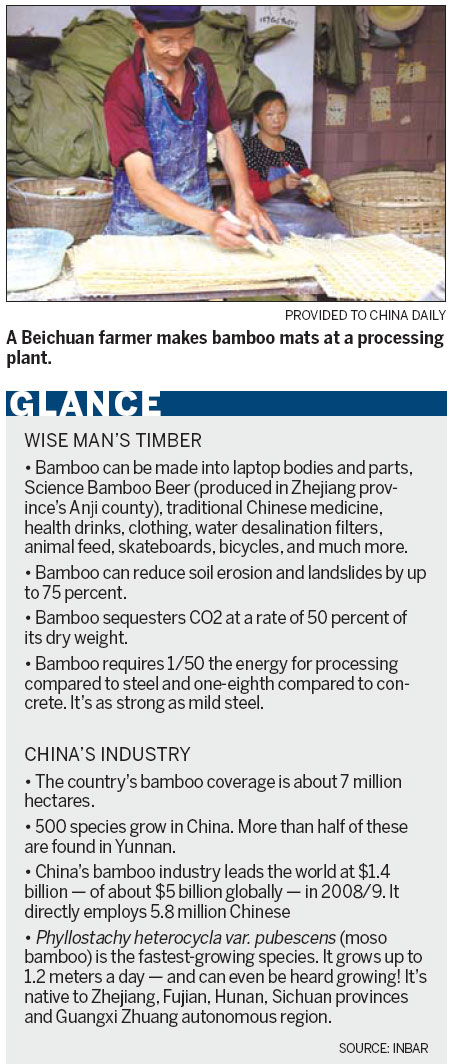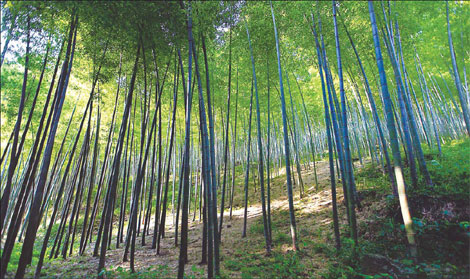Society
Cultivating prosperity
Updated: 2011-07-06 07:46
By Erik Nilsson (China Daily)
|
Bamboo has been both economically and ecologically important to many of the country's mountainous regions. Nan Ke / China Daily |
Seizing on quick-growing bamboo's versatility, rural processing plants are helping farmers in quake-ravaged Beichuan county of Sichuan province shake off their poverty. Erik Nilsson reports.
Bamboo's alchemic ability to turn into anything from cosmetics to speakers could create a relative gold rush for poor farmers like Li Cheng in Sichuan province's quake-ravaged Beichuan county - and across the developing world.
Still, Li worries about selling this year's harvest.
Bamboo cultivation may yield the prosperity that has eluded this topographically treacherous area near the Wenchuan quake zone's epicenter, where the mountains give rise to the temblors, rockslides and poor soil that multiply its privation.
The 38-year-old from Zhandou village in Sichuan province's Beichuan county, near the epicenter of the 8.0-magnitude earthquake that left 90,000 dead or missing in 2008, says his 2.7 hectares of moso bamboo shoots bring in up to 3,000 yuan ($464) a year.
"If I could sell everything my bamboo forest produced, I could earn up to 6,000 yuan a year from it," Li says.
"But bamboo sales are stagnant, so I haven't sold much for several years. There's no processing plant near me, so raw materials go for a very low price."
Beichuan county's forestry bureau secretary Jiang Libin believes the proliferation of cooperative rural processing plants, such as the Beichuan Qiang Minority Bamboo Fiber Industry Co Ltd base in Xiangquan township, can transform the lives of Beichuan's farmers, including Li's.
It could add 500 yuan to farmers' annual incomes, which average 1,350 yuan, Jiang says.
"Before, farmers could only sell bamboo as raw material," he says. "But the spread of processing plants that produce more value-added products has enabled them to earn more money."
So Beichuan plans to increase the number of processing centers and expand bamboo coverage from 2,000 hectares to 15,000 hectares by the end of the 12th Five-Year Plan (2011-2015).
"Beichuan is still an agricultural county that abounds in bamboo and mountains," Jiang says. "Farmers lose money planting cash crops on the high mountains, so they use the land for subsistence farming."
Bamboo could not only enhance their livelihoods but also protect the alpine earth from erosion and landslides, Jiang says.
As the Xiangquan township processing plant's chairwoman Liu Lan puts it: "It's a good basis for constructing the new socialist countryside and the most effective way of treating soil erosion in the quake zone's mountains."
She waves her hand toward the alp next to the production base and says, "One side of this mountain has bamboo and experiences no mudslides, rockslides or erosion. But the other side experiences frequent natural disasters."
Bamboo can be processed into quake-resistant materials, explains Lou Yiping, the China partnership program director of the International Network for Bamboo and Rattan (INBAR).
"Bamboo is stronger for its weight than mild steel and is also extremely flexible. So for this reason it is able to withstand earthquake tremors particularly well," says Lou, whose intergovernmental organization is dedicated to the plants' contributions to sustainable development in impoverished areas.
"What makes bamboo even more suitable for communities who are vulnerable to earthquakes is that it's lightweight and affordable. And, in the case of Sichuan, it's locally available."
Jiang says many of the bamboo houses in Beichuan withstood the 2008 quake, but Lou believes it's important to develop construction standards for quake-resistant bamboo homes.
And Liu Lan of the processing plant says bamboo's most important role is protecting Beichuan's farmers from the manmade catastrophe of poverty.
"If bamboo was grown on a large scale, it could improve farmers' incomes on a greater scale and improve the Yangtze River's ecology," she says.
Lou explains this has become the main objective of INBAR's work in China. "The more the project has evolved, the more it has become about building long-term livelihoods through a strong, sustainable local bamboo industry," he says.
The Xiangquan plant's general manager, Liu Shengjun, explains the operation is 51 percent privately owned, and the villagers control the remaining shares as a cooperative.
"The farmers sign agreements with neighbors," he says. "They sell us bamboo, and their neighbors receive dividends."
The plant receives bamboo from 20 households in one village, Liu says.
"Beichuan has many villages," Liu Lan says.
"We could have 30,000 to 50,000 farmers provide bamboo. If farmers want to cooperate, we will install equipment in their homes to enable them to process bamboo according to our standards."
Liu Shengjun views his plant as a model.
"We have a vision of 100 of these rural bases," he says.
The plant currently creates 30 types of products, many of which the company has patented.
Liu Lan explains her plant is finding new uses for "the oldest plant of the Qiang people".
These include cosmetics, towels, plywood, car interior panels, carpet, funerary money and the high-grade speakers in Lexus luxury vehicles, she says.
She says bamboo is essentially a pollution-free product from the time it's planted until it's turned into a commodity.
In the processing plant's showroom, she points to displays of particleboard made without glue and fibers created without waste, water, gas or chemicals.
Holding up a car-interior cushion, she says, "If every car cushion was made of this, we wouldn't have as many diseases caused by pollution. This could be a way for China to contribute to the global development of an environmentally sustainable economy."
Bamboo provides environmental benefits before it's processed, too, she explains.
"About 667 square meters of bamboo forest can absorb 20 percent more carbon dioxide than the same area of ordinary trees," she says.
"We have the technology and patents but lack the money to spread production."
Instead of making high-end products, about half of Sichuan's bamboo processing plants mostly process paper, as bamboo is replacing wood pulp as paper's raw material worldwide, Jiang says.
INBAR also worked with the local government to establish the 50-member Beichuan Qiang Ethnicity Autonomous County Township Bamboo Industrial Association.
Li Cheng and his neighbor, Li Xingwen, are members of the association, which introduces superior species and trains farmers in cultivation methods.
"We used to just leave the bamboo to grow naturally and didn't do anything to cultivate it," Li Xingwen says.
The farmers explain they learned to not sweep away fallen leaves, which fertilize and protect shoots, and to bury the bamboo deeper in the ground to ensure faster growth.
"Before, 0.7 hectares could yield 10,000 kg of bamboo. Now, 0.7 hectares can produce an additional 1,000 kg," Li Xingwen says.
He can earn a profit of 40,000 yuan to 50,000 yuan a year from his 27 hectares of high-end cizhu bamboo, out of a gross income of 120,000 yuan to 150,000 yuan, he says.
"The rest goes to pay the laborers," he explains. "I'm 60. I'm too old to work."
He says he hopes to bring more land under bamboo cultivation. "Many farmers sell locally and can get 6 jiao (9 US cents) for 14 kg," he says.
"So I hire someone to take my bamboo to sell in Guanghai, Mianyang and Chengdu cities. There, you can sell that amount for 8 or 9 jiao and sometimes even 1 yuan."
Li Cheng says he hopes Sichuan can create a network of processing plants like the one that has flourished in Zhejiang province. And he hopes consumers will choose products made from bamboo, he says, pointing to the popularity of goods such as plastic chairs as a market obstacle.
"I plan to plant more bamboo on some wasteland, but worry about how it will sell," he says.
"Sales have been stagnant for a while. I hope a solution can be found to this problem."

E-paper

Shining through
Chinese fireworks overcome cloudy times, pin hopes on burgeoning domestic demand
Pen mightier than the sword
Stroke of luck
Romance by the sea
Specials

90th anniversary of the CPC
The Party has been leading the country and people to prosperity.

My China story
Foreign readers are invited to share your China stories.

Green makeover
Cleanup of Xi'an wasteland pays off for ancient city

